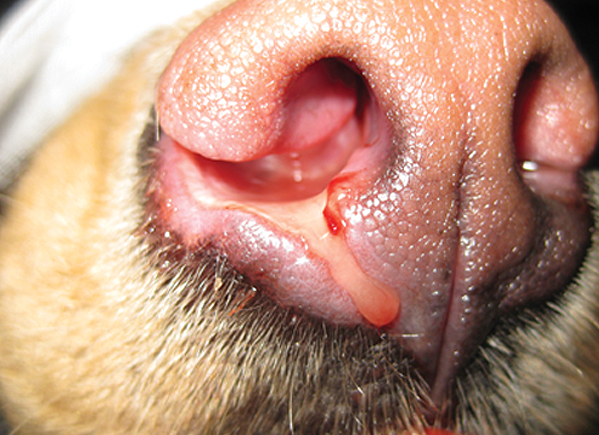Fungal rhinitis in dogs
Fungal Rhinitis In Dogs. The average survival time of dogs with nasal tumours without treatment is three months so a history exceeding this without significant progression of clinical signs or morbidity makes a tumour. Fungal rhinitis in dogs is usually caused by a fungal species called Aspergillus fumigatus known as aspergillosis or fungal rhinitis. Certain species of a common fungus called Aspergillus can infect the nasal cavity and sinuses of dogs and can even become disseminated to different areas of the body. Fungal rhinitis in dogs is usually caused by a fungus species called Aspergillus fumigatus and this common association has led to the term aspergillosis often being used interchangeably with fungal rhinitis.
 Mucopurulent Nasal Discharge In A Dog Affected By Sinonasal Aspergillosis Download Scientific Diagram From researchgate.net
Mucopurulent Nasal Discharge In A Dog Affected By Sinonasal Aspergillosis Download Scientific Diagram From researchgate.net
Aspergillus is a very common fungal organism commonly found in compost piles stables and barns. Plasia or fungal rhinitis23 Dogs with nasal neoplasia com-monly exhibit a soft-tissue density with extensive turbinate destruction while those with fungal rhinitis exhibit extensive. Rhinitis LPR also referred to as inflammatory. In 2 cases a diagnosis of fungal rhinitis was obtained based solely on cytopathology while in 7 cases â mycosis of nasal mucosa was confirmed by histopathology. Rhinitis Pneumonyssoides caninum and primary ciliary. Previous studies have shown that idiopathic lymphoplasmacytic rhinitis LPR is the second most common chronic disease of the nasal cavity in dogs after nasal neoplasia 1234Rhinitis caused by foreign bodies or secondary to odontogenic disorder is less frequently diagnosed in dogs 1 4The clinical features of LPR include nasal discharge epistaxis reverse.
Certain species of a common fungus called Aspergillus can infect the nasal cavity and sinuses of dogs and can even become disseminated to different areas of the body.
The fungus is also found–although rarely–in. Rhinitis in dogs is a common respiratory condition that involves inflammation of the tissue lining the dogs nasal cavity. Rhinitis Pneumonyssoides caninum and primary ciliary. Fungal rhinitis is an infection involving the nose and sinuses air spaces within the skull. The average survival time of dogs with nasal tumours without treatment is three months so a history exceeding this without significant progression of clinical signs or morbidity makes a tumour. Fungal rhinitis can be painful causing dogs to be head shy that is avoid having their heads pet.
 Source: mekclub.com
Source: mekclub.com
In 9 of 43 dogs 205 all males aged 1 to 13 years examinations led to a diagnosis of fungal rhinitis. Aspergillus fumigatus is the most common cause of fungal rhinitis in dogs but occasionally Penicillium spp Rhinosporidium seeberi and very rarely Cryptococcus neoformans may cause disease in dogs. Fungal rhinitis is an infection involving the nose and sinuses air spaces within the skull. Plasia or fungal rhinitis23 Dogs with nasal neoplasia com-monly exhibit a soft-tissue density with extensive turbinate destruction while those with fungal rhinitis exhibit extensive. In 2 cases a diagnosis of fungal rhinitis was obtained based solely on cytopathology while in 7 cases â mycosis of nasal mucosa was confirmed by histopathology.
 Source: urbananimalveterinary.com
Source: urbananimalveterinary.com
Important in dogs with fungal rhinitis or nasal neoplasia where early diagnosis will improve response to therapy. Dogs include nasal neoplasia fungal rhinitis and lymphoplasmacytic. A root abscess is caused by a bacterial infection in the root canal. A recent investigation of microbial involvement in LPR failed however to demonstrate differences in the bacterial load of nasal tissues from dogs with LPR fungal rhinitis and nasal neoplasia using molecular detection methods and also failed to detect DNA or RNA for Chlamydophila Bartonella Mycoplasma canine adenovirus 2 CAV-2 or. Fungal rhinitis is an infection involving the nose and sinuses air spaces within the skull.
 Source: ndsr.co.uk
Source: ndsr.co.uk
A foul odor to your dogs breath could be caused by the bacterial component of a sinus infection or because of a primary dental issue. A recent investigation of microbial involvement in LPR failed however to demonstrate differences in the bacterial load of nasal tissues from dogs with LPR fungal rhinitis and nasal neoplasia using molecular detection methods and also failed to detect DNA or RNA for Chlamydophila Bartonella Mycoplasma canine adenovirus 2 CAV-2 or. A root abscess is caused by a bacterial infection in the root canal. The most common presenting sign is chronic nasal discharge. In dogs the most prevalent mycosis in the nasal cavity and frontal sinuses is caused by Aspergillus spp.
 Source: ndsr.co.uk
Source: ndsr.co.uk
Dogs include nasal neoplasia fungal rhinitis and lymphoplasmacytic. Plasia or fungal rhinitis23 Dogs with nasal neoplasia com-monly exhibit a soft-tissue density with extensive turbinate destruction while those with fungal rhinitis exhibit extensive. Sneezing frequently precedes the onset of notable nasal discharge. Fungal diseases involving the nasal cavity the frontal sinuses and the nasal plane occur in both dogs and cats. This condition can have a variety of symptoms and causes.
 Source: researchgate.net
Source: researchgate.net
Certain species of a common fungus called Aspergillus can infect the nasal cavity and sinuses of dogs and can even become disseminated to different areas of the body. Aspergillus fumigatus is the most common cause of fungal rhinitis in dogs. Rhinitis is the term applied to an infection or inflammation of the nose. A root abscess is caused by a bacterial infection in the root canal. Forty three dogs were examined using rhinoscopy because of the presence of chronic airway symptoms.
 Source: semanticscholar.org
Source: semanticscholar.org
Fungal sinus infections can be painful and can cause your dog to shy away if you try to pet them on the head. Rhinitis Pneumonyssoides caninum and primary ciliary. Fungal sinus infections can be painful and can cause your dog to shy away if you try to pet them on the head. Rhinitis LPR also referred to as inflammatory. Inflammatory rhinitis is commonly found in dogs with.
 Source: sciencedirect.com
Source: sciencedirect.com
Other causes of chronic nasal disease include. Rhinitis is the term applied to an infection or inflammation of the nose. The average survival time of dogs with nasal tumours without treatment is three months so a history exceeding this without significant progression of clinical signs or morbidity makes a tumour. Previous studies have shown that idiopathic lymphoplasmacytic rhinitis LPR is the second most common chronic disease of the nasal cavity in dogs after nasal neoplasia 1234Rhinitis caused by foreign bodies or secondary to odontogenic disorder is less frequently diagnosed in dogs 1 4The clinical features of LPR include nasal discharge epistaxis reverse. The most common presenting sign is chronic nasal discharge.
 Source: petcoach.co
Source: petcoach.co
A foul odor to your dogs breath could be caused by the bacterial component of a sinus infection or because of a primary dental issue. In 9 of 43 dogs 205 all males aged 1 to 13 years examinations led to a diagnosis of fungal rhinitis. Certain species of a common fungus called Aspergillus can infect the nasal cavity and sinuses of dogs and can even become disseminated to different areas of the body. Clinical examination routine hematology and serum biochem. Clinical signs can mimic other conditions but a careful work-up should allow a definitive diagnosis.
Source:
Clinical signs can mimic other conditions but a careful work-up should allow a definitive diagnosis. Dogs affected by exposure to this fungus are usually immunosuppressed. Inflammatory rhinitis is commonly found in dogs with. The most common presenting sign is chronic nasal discharge. Fungal sinus infections can be painful and can cause your dog to shy away if you try to pet them on the head.
 Source: researchgate.net
Source: researchgate.net
In 2 cases a diagnosis of fungal rhinitis was obtained based solely on cytopathology while in 7 cases â mycosis of nasal mucosa was confirmed by histopathology. The average survival time of dogs with nasal tumours without treatment is three months so a history exceeding this without significant progression of clinical signs or morbidity makes a tumour. The fungus is also found–although rarely–in. Tumors fungal disease or chronic inflammatory rhinitis can cause a chronic nasal discharge that starts out as 1-sided but becomes 2-sided. Rhinitis Pneumonyssoides caninum and primary ciliary.
 Source: bvajournals.onlinelibrary.wiley.com
Source: bvajournals.onlinelibrary.wiley.com
Allergic rhinitis can happen seasonally or year-round. Diagnosis of either form the nasal form or disseminated form can be difficult usually requiring X-rays or more advanced imaging such. Sneezing frequently precedes the onset of notable nasal discharge. Nasal foreign body rhinitis secondary to dental disease parasitic. Sneezing is an attempt to clear the upper airways of discharge.
 Source: cliniciansbrief.com
Source: cliniciansbrief.com
Important in dogs with fungal rhinitis or nasal neoplasia where early diagnosis will improve response to therapy. Dogs include nasal neoplasia fungal rhinitis and lymphoplasmacytic. Nasal distress in your pooch indicates he might be suffering from fungal rhinitis more commonly known as nasal aspergillosis. Sneezing frequently precedes the onset of notable nasal discharge. Clinical signs can mimic other conditions but a careful work-up should allow a definitive diagnosis.
If you find this site serviceableness, please support us by sharing this posts to your favorite social media accounts like Facebook, Instagram and so on or you can also bookmark this blog page with the title fungal rhinitis in dogs by using Ctrl + D for devices a laptop with a Windows operating system or Command + D for laptops with an Apple operating system. If you use a smartphone, you can also use the drawer menu of the browser you are using. Whether it’s a Windows, Mac, iOS or Android operating system, you will still be able to bookmark this website.






